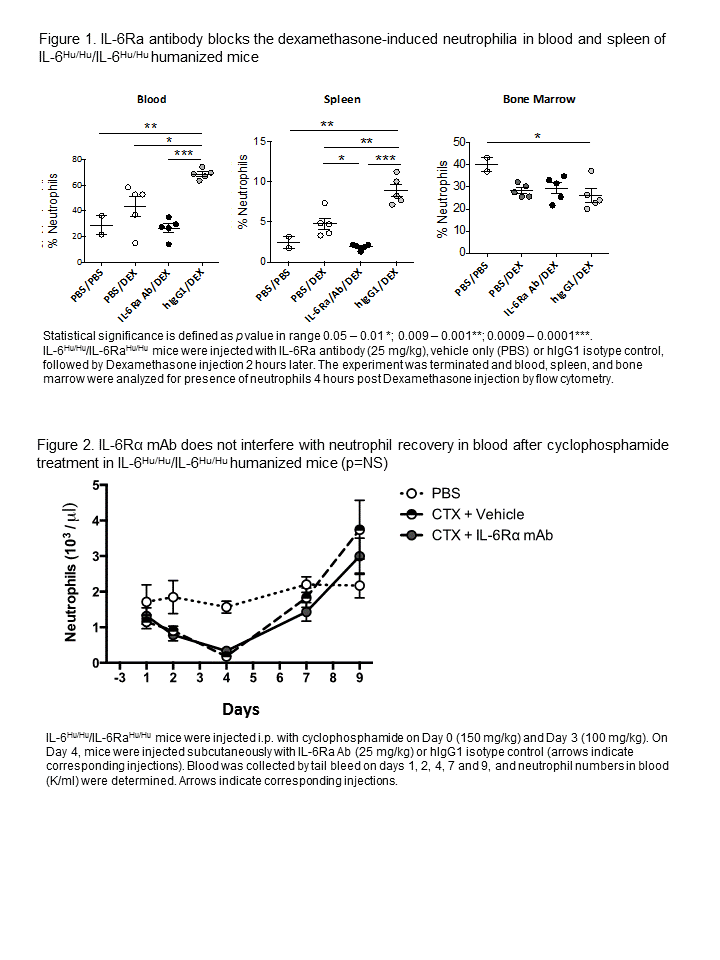Session Information
Session Type: Abstract Submissions (ACR)
Background/Purpose:
Blockade of IL-6/IL-6Rα signaling is associated with a reduction of circulating neutrophils in the blood of patients treated with anti-IL-6Rα mAb but the mechanism is unknown. Due to the lack of IL-6Rα mAb effect on neutrophils in naïve mice, we established a mouse model of dexamethasone (DEX)-induced neutrophilia to explore the impact of anti-IL-6Rα mAb on neutrophil distribution, differentiation and recovery in vivo.
Methods:
Wild type C57Bl/6 or IL-6RαHu/Hu/IL-6Hu/Hu mice were injected with anti-mouse (REGN844) or anti-human IL-6Rα mAb (REGN88, sarilumab), respectively. DEX was injected 2 hrs after mAb injection to induce a temporary increase of neutrophils in the periphery. Mice were euthanized 4 hrs after DEX injection, and blood, spleen, and bone marrow were evaluated for neutrophil levels by flow cytometry. Neutrophil apoptosis was assessed by active Caspase-3 staining in the above tissues. In another experiment, mice were injected with cyclophosphamide (CTX), resulting in temporary neutropenia. Recovery of neutrophils in peripheral blood in the presence or absence of IL-6Ra mAb was monitored for six days after CPM injection.
Results:
Treatment of naïve C57Bl/6 mice with IL-6Rα mAb alone did not affect neutrophil levels in blood, spleen or bone marrow. We found that IL-6Rα mAb reversed the DEX effect in both mouse strains (Figure 1). This reversal was not associated with apoptosis as assayed by active Caspase-3 staining in spleen and bone marrow in C57Bl/6 mice. Furthermore, in IL-6RαHu/Hu/IL-6Hu/Hu mice treated with CTX, neutrophil numbers in blood recovered to a comparable level in the presence of IL-6Rα mAb or hIgG1 isotype (Figure 2), indicating that differentiation and exit of neutrophils from bone marrow was not affected by IL-6Rα mAb treatment.
Conclusion:
In a mouse model of DEX-induced neutrophilia, IL-6Rα mAb treatment negated the DEX effect in both C57Bl/6 and IL-6RαHu/Hu/IL-6Hu/Hu mice. This effect was not associated with Caspase-3 mediated apoptosis, although alternative apoptotic pathways should be explored. IL-6Rα mAb did not prevent the recovery of neutrophils in blood following CPM treatment. These data suggest that the reduction in circulating neutrophil counts observed with IL-6Rα mAb treatment are not due to effects within the bone marrow and may be due to effects on neutrophil margination.
 |
Disclosure:
L. Kelly,
Regeneron,
3,
Regeneron,
1;
V. Decman,
Regeneron,
3,
Regeneron,
1;
D. Skokos,
Regeneron,
3,
Regeneron,
1.
« Back to 2013 ACR/ARHP Annual Meeting
ACR Meeting Abstracts - https://acrabstracts.org/abstract/reduction-of-circulating-blood-neutrophils-in-mice-by-anti-il-6r-alpha-monoclonal-antibody-is-not-due-to-apoptosis-or-blockade-of-neutrophil-differentiation/
